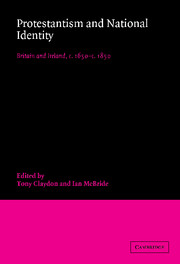Book contents
- Frontmatter
- Contents
- List of contributors
- Acknowledgements
- List of abbreviations
- Introduction
- England
- 2 ‘I love my King and my Country, but a Roman catholic I hate’: anti-catholicism, xenophobia and national identity in eighteenth-century England
- 3 Confessional state or elect nation? Religion and identity in eighteenth–century England
- 4 ‘To protect English liberties’: the English nationalist revolution of 1688–1689
- 5 A history of variations: the identity of the eighteenth-century church of England
- Britain and Ireland
- Britain, Ireland and the world
- Index
5 - A history of variations: the identity of the eighteenth-century church of England
Published online by Cambridge University Press: 16 October 2009
- Frontmatter
- Contents
- List of contributors
- Acknowledgements
- List of abbreviations
- Introduction
- England
- 2 ‘I love my King and my Country, but a Roman catholic I hate’: anti-catholicism, xenophobia and national identity in eighteenth-century England
- 3 Confessional state or elect nation? Religion and identity in eighteenth–century England
- 4 ‘To protect English liberties’: the English nationalist revolution of 1688–1689
- 5 A history of variations: the identity of the eighteenth-century church of England
- Britain and Ireland
- Britain, Ireland and the world
- Index
Summary
In the profession of Christianity, the variety of national characters may be clearly distinguished.
Gibbon, The decline and fall of the Roman empireIn 1753, in a typically audacious act of intellectual precocity, the sixteen-year-old Edward Gibbon, who came to possess one of the most cosmopolitan of English intellects, converted to Catholicism. Though Edward Gibbon senior had been tutored by the notably pious nonjuror William Law, he was a casualty of his own half-hearted worldliness, and quickly set about rescuing his wayward son from the clutches of continental ‘superstition’: an error to which he himself was so allergic as to condone the attempted inculcation in his child of the scepticism of David Mallet, Bolingbroke's publisher. When this remarkable venture failed, it was to Switzerland that the son was dispatched in order to be reclaimed for the greater protestant fold. After the apparent success of his Swiss cure, Gibbon continued to develop in his un-English manner. Scottish scepticism seeped into his soul from readings of Hume, and the infidelities of the philosopher continued both to attract and to repel his scholarly sensibility through his subsequent intellectual life.
A number of lessons can be learned from Gibbon's early experience and subsequent career, some of which are more typical of his contemporaries than the actual details of his conversion, reconversion and ultimate, if tacit, apostasy. For example, his father's hearty detestation of most things catholic was a principal leitmotif of English self-identity in the eighteenth century, whether acquired in contradistinction to the French, the Irish or any number of continental nations.
- Type
- Chapter
- Information
- Protestantism and National IdentityBritain and Ireland, c.1650–c.1850, pp. 105 - 128Publisher: Cambridge University PressPrint publication year: 1998
- 3
- Cited by



